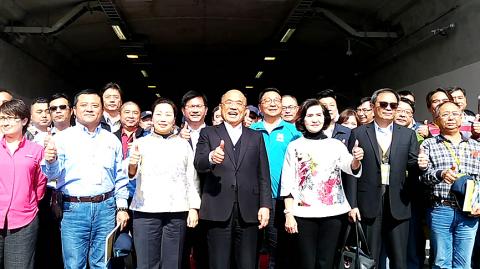Safer and faster road travel in eastern Taiwan became a reality yesterday with the official opening of the improved Suhua Highway connecting Yilan and Hualien counties, shortening travel time between the two counties from almost 160 minutes to 100.
Premier Su Tseng-chang (蘇貞昌) told the inauguration ceremony that the government would continue to enhance road safety on sections not covered by the improved highway.
The upgraded road bypasses the most dangerous parts of the old highway, mostly through the use of tunnels, which account for more than 60 percent of the new road, the Ministry of Transportation and Communications said.

Photo: Chiang Chih-hsiung, Taipei Times
The 38.8km project covers three sections: from Suao (蘇澳) to Dongao (東澳) townships in Yilan County; from Yilan’s Nanao Township (南澳) to Heping Township (和平) in Hualien County; and from Hejhong (和中) to Dacingshuei (大清水) in Hualien.
The first stretch opened on Feb. 5, 2018, and the second and third sections opened yesterday.
As the improved highway allows for a reduction of one hour in travel time between Yilan and Hualien counties, tourism industry operators in Hualien expressed hope the improved highway will boost tourism in the county.
Hualien Hostel Association director Chen Ping-chung (陳秉忠) said he hopes tourism numbers increase by 30 percent in the coming year, and said industry revenue could increase by as much as NT$6.6 billion (US$219.2 million).
Accommodations providers were seeing a 90 percent occupancy rate for the Lunar New Year holiday later this month, and they hoped to reach full occupancy before mid-February, he said.
However, Hualien Tourism Hotel Trade Association director Kao Shui-lu (高水祿) said occupancy rates varied by hotel, with some reporting only 70 percent occupancy for the first four days of the holiday, which begins on Jan. 24, and others reporting 80 to 90 percent occupancy.
He hoped the highway would bring more tourists into Hualien in the future, Kao said.
Yilan accommodations providers are concerned they will be marginalized as tourism to Hualien increases, with many citing as an example the reduction of tourism in New Taipei City’s Pinglin District (坪林) after improvements to the Chiang Wei-shui Memorial Freeway (Freeway No. 5) made areas further south more accessible.
Whether tourism in Yilan would be affected would require looking at how traffic jams develop on the Suhua Highway, Yilan Association of Tourism director Wang Wen-hsin (王文新) said.
In the past, travelers from Taipei would spend a night in Yilan and then a night in Hualien before heading home, but with the improved road, they might instead opt to spend two nights in Hualien, or even travel to Taitung, he said.
However, if traffic jams occurred on the highway they may simply do as they did in the past and stay for a night in Yilan, he said.
Yilan would attempt to offset possible losses by marketing the county’s special characteristics, and would also attempt to attract visitors with deals on accommodations, Yilan County Business and Tourism Department Director Lee Tung-ju (李東儒) said.
Yesterday also saw the start of the first direct daily bus service between greater Taipei and Hualien, with buses departing every 20-30 minutes from Taipei’s Nangang District (南港) and New Taipei City’s Banciao District (板橋).
The trip would take an average 3.5 hours one way and cost NT$320 to NT$352, the ministry said.

‘FORM OF PROTEST’: The German Institute Taipei said it was ‘shocked’ to see Nazi symbolism used in connection with political aims as it condemned the incident Sung Chien-liang (宋建樑), who led efforts to recall Democratic Progressive Party (DPP) Legislator Lee Kun-cheng (李坤城), was released on bail of NT$80,000 yesterday amid an outcry over a Nazi armband he wore to questioning the night before. Sung arrived at the New Taipei City District Prosecutors’ Office for questioning in a recall petition forgery case on Tuesday night wearing a red armband bearing a swastika, carrying a copy of Adolf Hitler’s Mein Kampf and giving a Nazi salute. Sung left the building at 1:15am without the armband and apparently covering the book with a coat. This is a serious international scandal and Chinese

PERSONAL DATA: The implicated KMT members allegedly compiled their petitions by copying names from party lists without the consent of the people concerned Judicial authorities searched six locations yesterday and questioned six people, including one elderly Chinese Nationalist Party (KMT) member and five KMT Youth League associates, about alleged signature forgery and fraud relating to their recall efforts against two Democratic Progressive Party (DPP) legislators. After launching a probe into alleged signature forgery and related fraud in the KMT’s recall effort, prosecutors received a number of complaints, including about one petition that had 1,748 signatures of voters whose family members said they had already passed away, and also voters who said they did not approve the use of their name, Taipei Deputy Chief Prosecutor

UNDER ATTACK: Raymond Greene said there were 412 billion malicious threats in the Asia-Pacific region in the first half of 2023, with 55 percent targeting Taiwan Taiwan not only faces military intimidation from China, but is also on the front line of global cybersecurity threats, and it is taking action to counter those attacks, President William Lai (賴清德) said yesterday. Speaking at the opening of this year’s Cybersec Expo in Taipei, the president assured foreign diplomats and exhibitors that Taiwan remained committed to strengthening its defense against cyberattacks and enhancing the resilience of its digital infrastructure. Lai referenced a report from the National Security Bureau (NSB) indicating that the Government Service Network faced an average of 2.4 million intrusion attempts daily last year, more than double the figure

Retired US general Robert B. Abrams reportedly served as adviser to Chief of the General Staff Admiral Mei Chia-shu (梅家樹) during the Ministry of National Defense’s computer-simulated war games in the buildup to this year’s 41st annual Han Kuang military exercises, local media reported yesterday. For 14 days and 13 nights starting on April 5 and ending yesterday, the armed forces conducted the computer-simulated war games component of the Han Kuang exercises, utilizing the joint theater-level simulation system (JTLS). Using the JTLS, the exercise simulated a continuous 24-hour confrontation based on scenarios such as “gray zone” incursions and the Chinese People’s Liberation